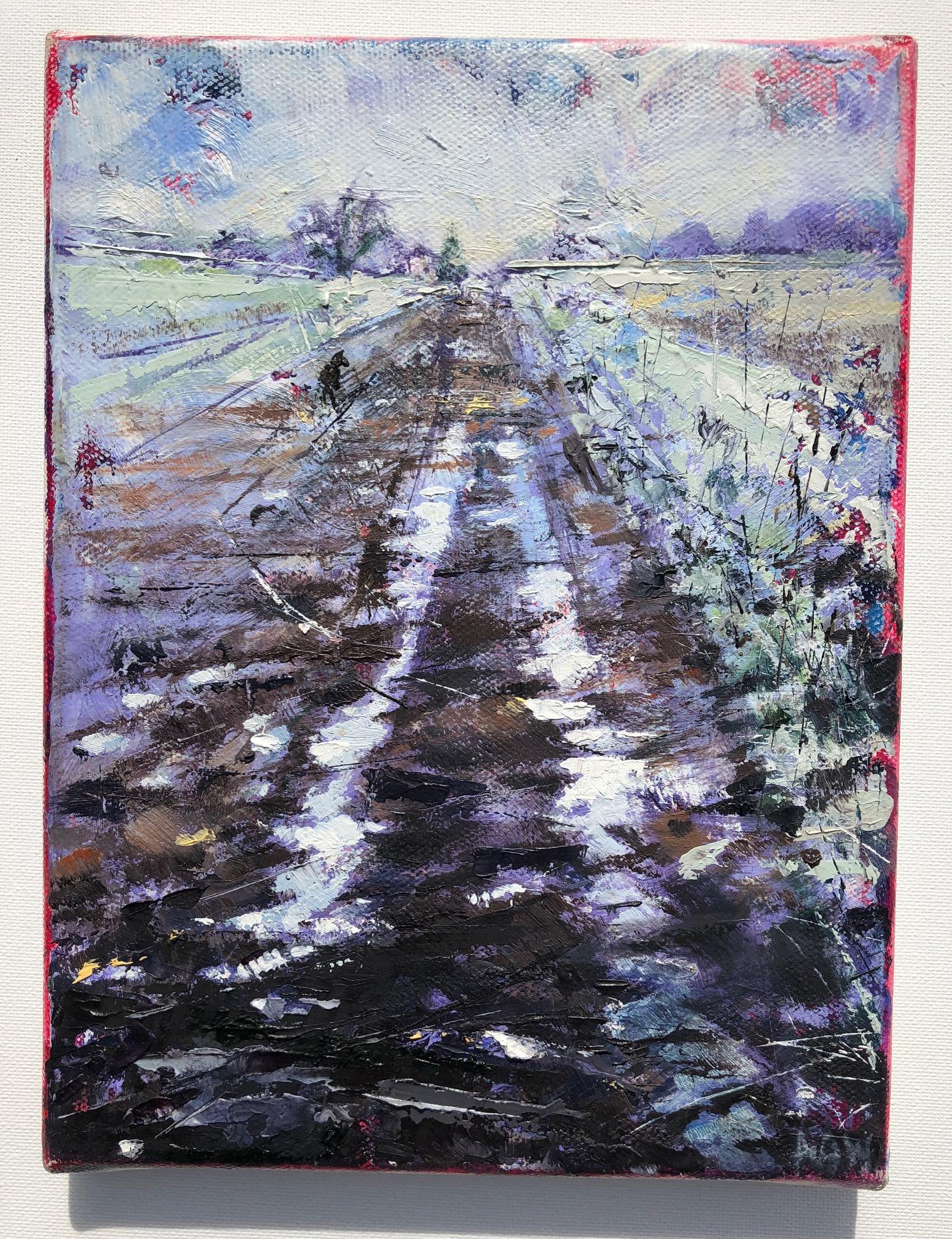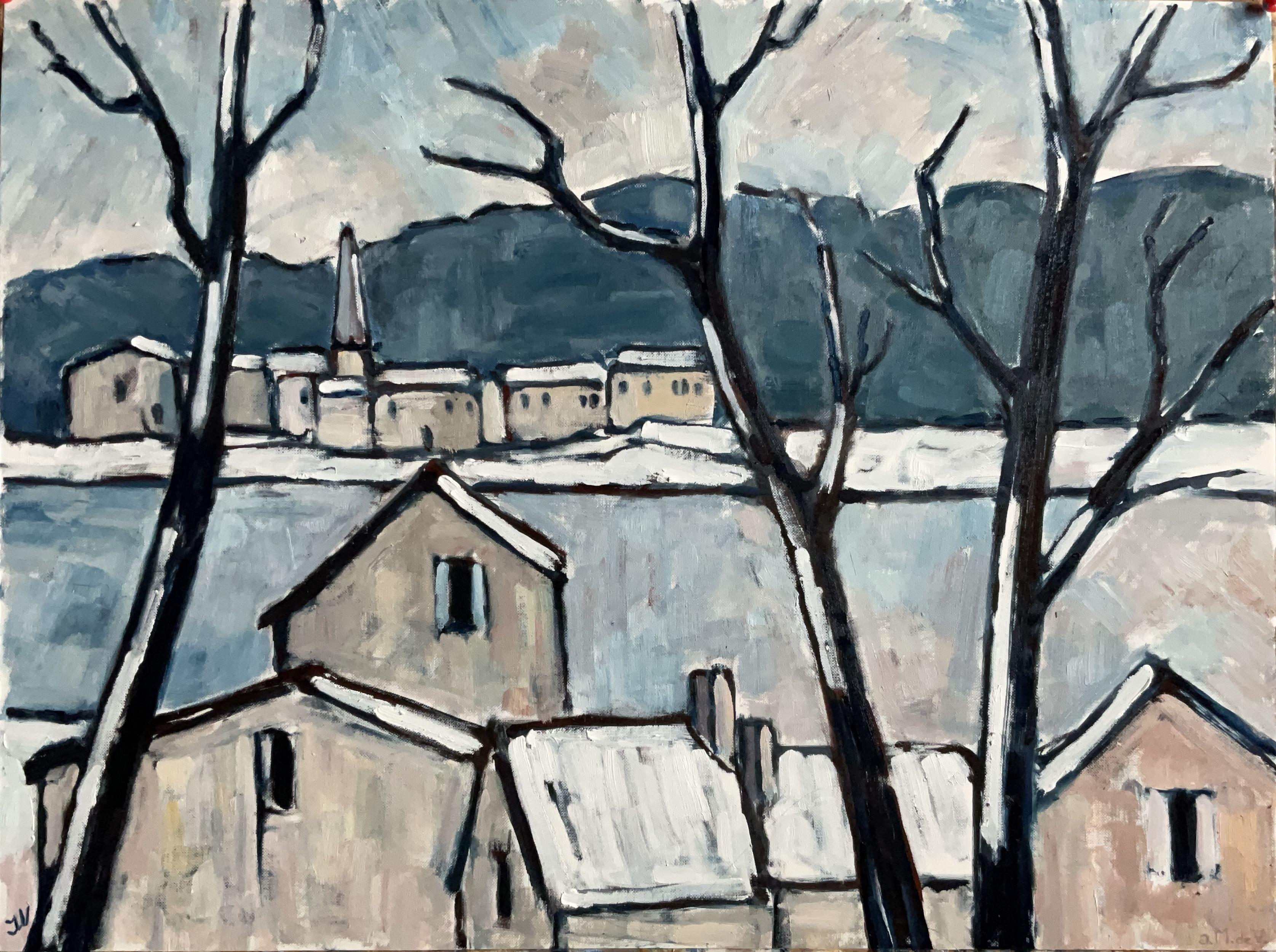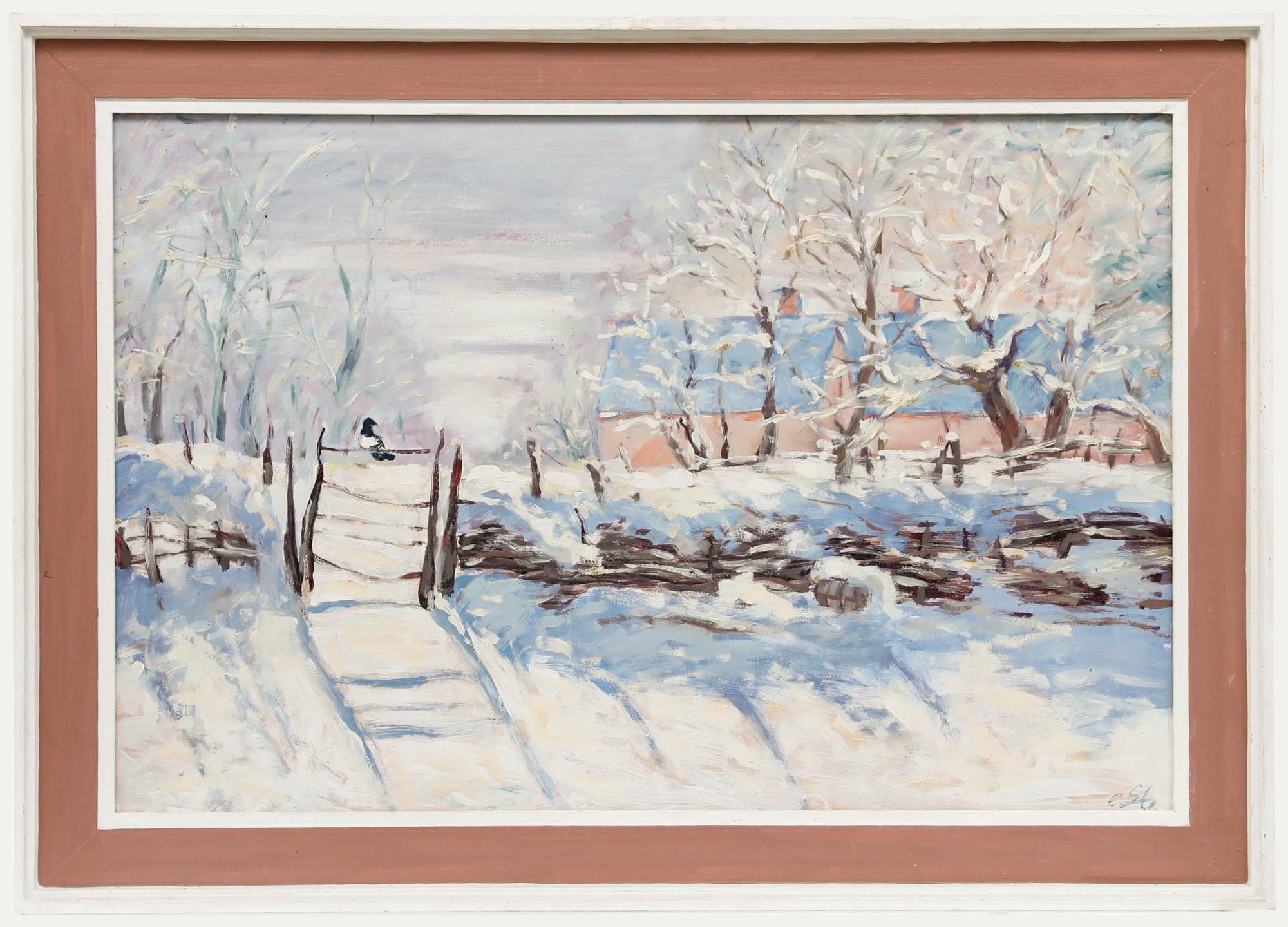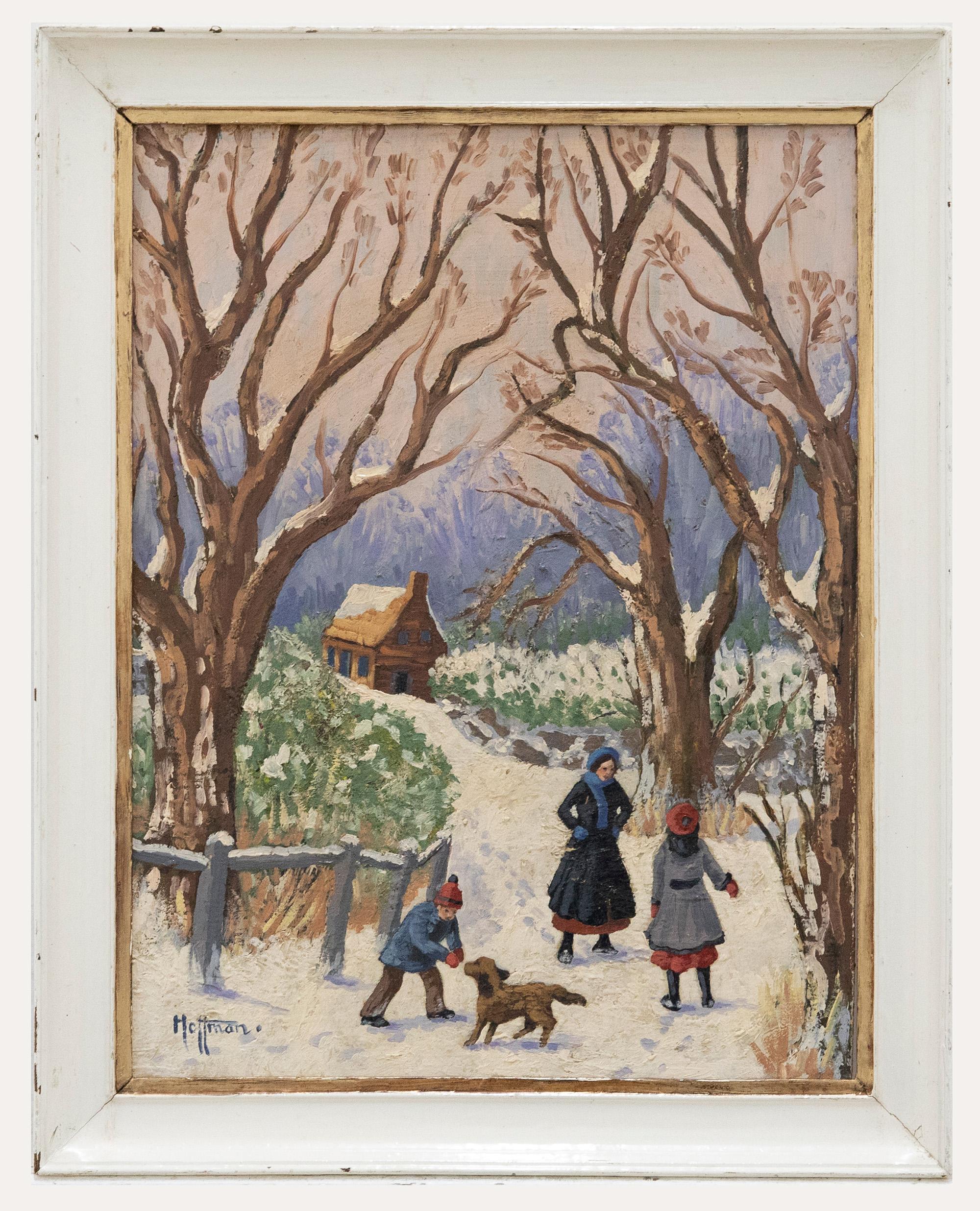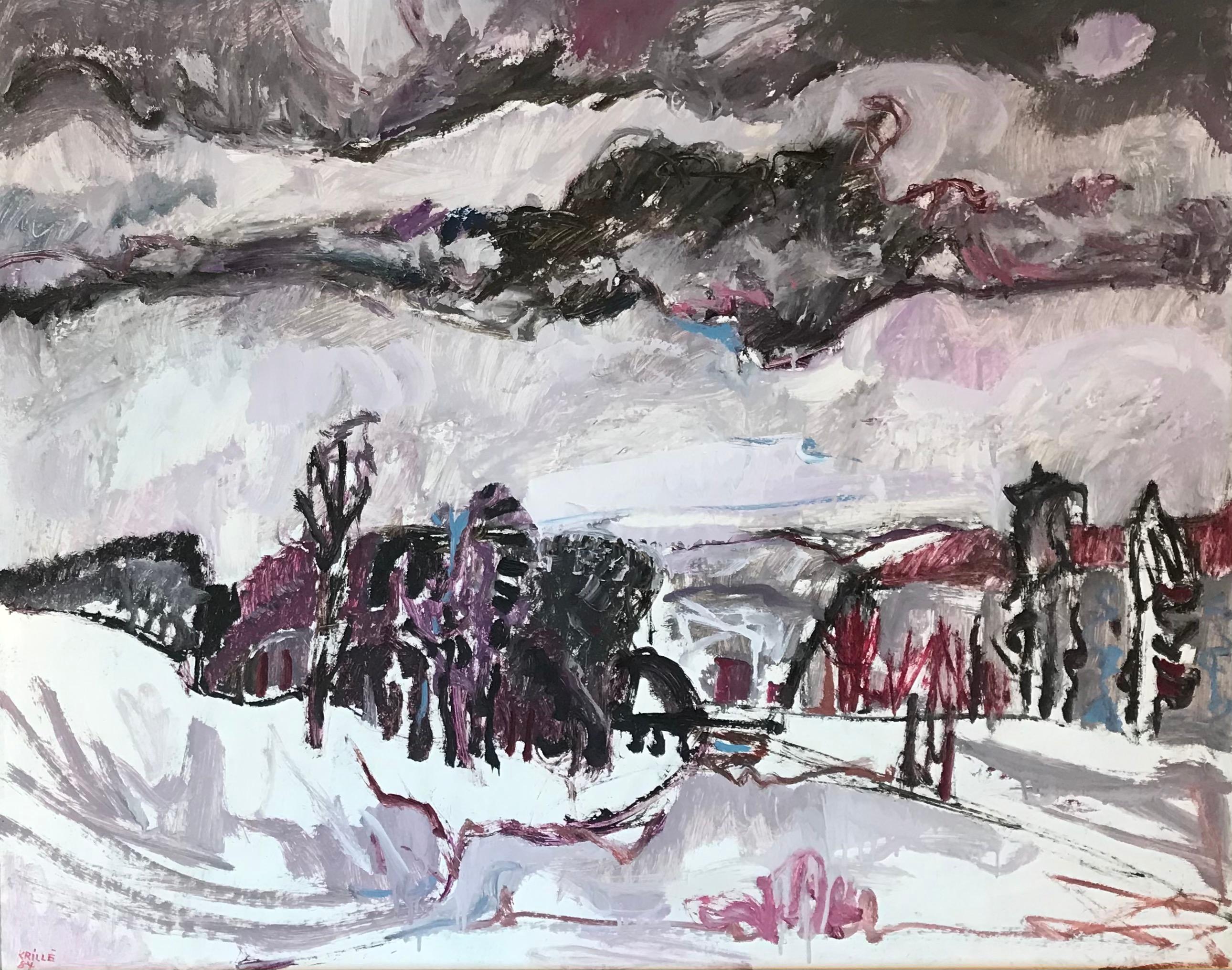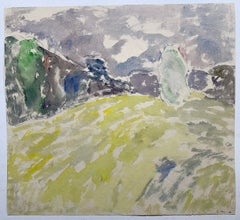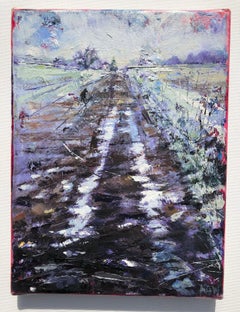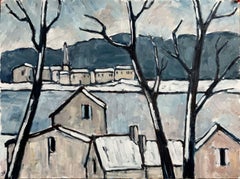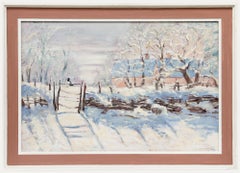Items Similar to Winter Walk with Jasper, (Black Cat painting)
Want more images or videos?
Request additional images or videos from the seller
1 of 11
Sterling Boyd StrauserWinter Walk with Jasper, (Black Cat painting)1970
1970
$3,000
$4,00025% Off
£2,231.49
£2,975.3225% Off
€2,612.64
€3,483.5225% Off
CA$4,186.02
CA$5,581.3625% Off
A$4,684.27
A$6,245.7025% Off
CHF 2,445.91
CHF 3,261.2125% Off
MX$57,588.25
MX$76,784.3425% Off
NOK 30,857.94
NOK 41,143.9225% Off
SEK 29,037.17
SEK 38,716.2225% Off
DKK 19,492.28
DKK 25,989.7025% Off
Shipping
Retrieving quote...The 1stDibs Promise:
Authenticity Guarantee,
Money-Back Guarantee,
24-Hour Cancellation
About the Item
Sterling Strauser (1907-1995). Dorothy and Jasper, Crystal Street Station, 1970. Oil on masonite panel, 11.5 x 22.25 inches. Signed and dated lower right. Very good condition with no damage or conservation. Unframed. Framing services available.
Image depicts the artist's wife, Dorothy Strauser, walking the beloved family cat, Jasper. In the background can be seen the East Stroudsburg Pa Train Depot on Crystal Street.
Provenance: Estate of the artist's Granddaughter, Princeton NJ.
Often called a romantic expressionist and American intimist, self-taught Pennsylvania artist Sterling Strauser (1907-1995) completed his first oil painting in 1922- inspired by frequent visits to the collection of American folk art at the Everhardt Museum in Scranton. Throughout the following seven decades of his career, Strauser’s artistic pursuit was based on his own intuition and determination to paint what he saw, rather than adhering to the conventional pictorial structures prescribed by prevailing styles at the time. Strauser rejected pretension, believing instead that art should work from life as it was lived. His oeuvre therefore serves as an extremely personal record of his observations and experiences from his lifetime painting in East Stroudsburg, Pennsylvania.
Beginning early in his career, Strauser took his inspiration from American regionalists and traditional realists in the Ashcan style, as well as European movements such as Fauvism and Cubism, yet he eventually developed his own fluid realism based on subject matter beloved and familiar to him- family and friends, local landscapes and floral still lifes.
Known for his distorted pictorial space, exaggerated with vivid color, heavy impasto and an intensity of emotion, Strauser was adept at altering and rearranging the details and aspects of any given form to create a new kind of beauty.
"All a painting has to do, or a piece of sculpture, or whatever, is to entertain the critical eye. You have to have a fresh seeing eye… to look at things like a child, as if looking at the world for the first time (seeing) something that somebody else doesn’t see, something you want to identify with… Painting is largely a matter of evaluation. (It) doesn’t matter how much it looks like the subject matter. It just depends on how interesting you have made it so that it pleases the critical eye."
STERLING STRAUSER, STERLING STRAUSER: A MODERNIST REVISTED, P. 23
Sterling exhibited his work extensively throughout the country and drew the attention of many notable fellow artists including Milton Avery, Louise Nevelson, David Burliuk, Chaim Gross and Red Grooms. Sterling was also extremely influential within the arts community of Pennsylvania through his discovery and promotion of self-taught American Folk artists such as Justin McCarthy, Jack Savitsky, Joseph Gatto and Charles Dieter.
Strauser and his wife Dorothy dedicated most of their lives to collecting and championing these folk artists, later referred to as the “Strauser Circle.”
Said the artist's grandaughter: “While I think every child is born with an aesthetic, few have grandparents who cultivate it as a matter of course. I was lucky; mine always did. In fact, every light switch plate, door and faucet knob – even the Analomink house skeleton key – were covered with paint-smudged fingerprints. I most vividly recall aqua smeared with swirls of yellow ochre.
In fact it wasn’t something I was consciously aware of, even in my late teens when I left for Temple University with an extra trunk filled with the art that hung in my bedroom for nearly two decades. I had no idea that while I was leaving home, I was taking the 'Strauser Circle' with me.”
Sterling Strauser was born in Bloomsburg, Pennsylvania. He began painting in 1926 in a near impressionist style that later evolved into a powerful Klee-like modernism. Still later his style softened into what one collector of his work termed "romantic American expressionism." He was also an illustrator for Mademoiselle magazine and Unicorn-A Magazine of Poetry.
Fellow artist, Russian David Burliuk, a member of the Blaue Reiter group in Munich, said of Strauser: "It is amazing to find a self-taught artist in a quaint little provincial village painting like the masters in the great art centers of the world."
With his wife, Dorothy, he was a collector and promoter of folk art, and for many years was a teacher, office manager, and supervisor of the boiler works at the Pocono, Pennsylvania public schools. Many of his sketching trips were into the Pocono Mountains. In 1996, a retrospective show was held at the Lyzon Gallery in Nashville, Tennessee. The most recent exhibition of his work, "A Modernist Revisited," was held at the Reading Public Museum in Pennsylvania from November 27, 1999 through Feb. 27, 2000.
Studied:
with George Keller
Bloomsburg State College, BA
Member:
Folk Art Society of America
Delaware River Gap Arts Association (annually awards the Sterling
Strauser Award)
Work:
Cheekwood Museum, Nashville, Tennessee
Everhart Museum of Natural History, Science and Art, Scranton,
Lehigh University Art Galleries, Bethlehem, Pennsylvania
Vanderbilt University, Nashville, Tennessee
American Museum in Britain, Bath, England
Allentown Art Museum, Allentown, Pennsylvania
Cigna Museum, Philadelphia
East Stroudsburg University College of Art
Maier Museum of Art, Randolph-Macon Woman's College, Lynchburg, Virginia
The White House, Washington, DC
Many corporate collections
Exhibited:
Salons of America, 1934
Art USA, New York City, 1958
Everhart Museum, 1958 (award)
Municipal Art Gallery, Davenport, Iowa, 1959
Lehigh University, 1961
William Penn Museum, Harrisburg, Pennsylvania, 1973
Worthington Avenue Gallery
Zimbalist Gallery, New York City, 1939
Shawnee-on Delaware, Pennsylvania, 1990s
Lyzon Gallery, Nashville, TN, 1996 (retrospective)
"A Modernist Revisited," Reading Public Museum, Pennsylvania,
Pennsylvania 2000
References:
Falk, Who Was Who in American Art 1564-1975
Lyzon Gallery, Nashville, Tennessee
Reading Public Museum, Sterling Strauser, A Modernist Revisited
Dunbier (ed.), The Artists Bluebook: 34,000 North American Artists to March 2005
Bowker, Who's Who in American Art 1993-94, 20th Edition
Jaques Cattell Press, Who's Who in American Art 1986
Jaques Cattell Press, Who's Who in American Art 12th Edition
- Creator:Sterling Boyd Strauser (1907 - 1995, American)
- Creation Year:1970
- Dimensions:Height: 11.5 in (29.21 cm)Width: 22.25 in (56.52 cm)Depth: 0.15 in (3.81 mm)
- Medium:
- Movement & Style:
- Period:
- Condition:
- Gallery Location:Wilton Manors, FL
- Reference Number:1stDibs: LU24527093172
About the Seller
4.9
Platinum Seller
Premium sellers with a 4.7+ rating and 24-hour response times
Established in 2007
1stDibs seller since 2015
407 sales on 1stDibs
Typical response time: 3 hours
- ShippingRetrieving quote...Shipping from: Wilton Manors, FL
- Return Policy
Authenticity Guarantee
In the unlikely event there’s an issue with an item’s authenticity, contact us within 1 year for a full refund. DetailsMoney-Back Guarantee
If your item is not as described, is damaged in transit, or does not arrive, contact us within 7 days for a full refund. Details24-Hour Cancellation
You have a 24-hour grace period in which to reconsider your purchase, with no questions asked.Vetted Professional Sellers
Our world-class sellers must adhere to strict standards for service and quality, maintaining the integrity of our listings.Price-Match Guarantee
If you find that a seller listed the same item for a lower price elsewhere, we’ll match it.Trusted Global Delivery
Our best-in-class carrier network provides specialized shipping options worldwide, including custom delivery.More From This Seller
View AllHouse in Snow (Winter Landscape)
Located in Wilton Manors, FL
Nicholas Maravell.
House in Snow, 1989.
Ink and watercolor on paper, 10.5 x 13.75 inches; 18 x 21.25 inches framed.
Signed with artist monogram lower right. Gallery label affixe...
Category
1980s Abstract Geometric Landscape Paintings
Materials
Ink, Watercolor
Woman Walking Dog
By Graciela Rodo Boulanger
Located in Wilton Manors, FL
Circle of Graciela Rodo Boulanger.
Woman Walking Dog, ca. 1970.
Oil on wood panel measuring 5 x 7 inches; 12.25 x 14.25 inches framed.
Signed indistinctly upper right.
Category
Mid-20th Century Abstract Figurative Paintings
Materials
Oil, Wood Panel
Russian Landscape (abstract painting)
Located in Wilton Manors, FL
Yuri Larin (1936-2014). Landscape, 1986. Watercolor on paper, 16.5 x 18.25 inches. Mounted on cardboard sheet measuring 24 x 28 inches. Signed and dated lower left. Excellent condition. Image is painted on verso side of block print wallpaper sheet of Russian manufacture. Sheet is carefully hinged at corners and can be removed from cardboard backing with relative ease.
Estate of Giovanni and Dagmar Migliuolo, NYC. Giovanni Migliuolo is the former Italian Ambassador to the United Nations, USSR and Egypt.
Yuri Larin, also Yuriy Larin (1936–2014) is a Russian painter and graphic artist, a member of the Union of Artists of the USSR since 1977. Larin was born in Moscow to the family of a key Soviet political leader, Nikolay Bukharin, and Anna Larina. Following the arrests of his parents in 1938 and until 1946, he lived with his relatives, and following the arrest of his step-father, he was taken to an orphanage near Stalingrad. A hydraulic engineer by training, he worked at the construction of the Saratov Hydro-Electric Plant and at design institutions. In 1960, he began his studies at the department of drawing and painting of the Krupskaya People’s University of Arts, and then, from 1965 until 1970, he studied at the department of art design at the Moscow State Higher School of Arts and Industry (the former Stroganov Institution). His career as a professional artist began in the early 1970s. From 1970 until 1986, he taught at the Moscow 1905 Memorial Arts School. His letter to prof. Vittorio Strada sent in 1980 contained the first statement of his artistic method he would later dub the “concept of the limit state”. He quit teaching after a serious illness, when he lost the ability to use his right hand. He only worked with his left hand since 1986. He died and was buried in Moscow.
Exhibitions:
1981
The sixth All-Union watercolor exhibition. Moscow
1982
Personal exhibition in Moscow Drama Theater after M.N.Ermolova (together with Ye.Kravchenko). Moscow.
1985
The eighth All-Union watercolor exhibition. Moscow
1987
The ninth All-Union watercolor exhibition. Moscow.
1989
Personal watercolor exhibition. Gallery “Books&Company Art”, NY, USA
Personal exhibition. The Central House of the Artist on Krymskiy Val, Moscow.
13 Biennale of the countries of the Baltic Region in Rostock, Germany.
1992
Personal exhibition of Russian and German landscapes. Duren, Germany.
The exhibition of the Russian graphics. Gallery «Raissa». Erfurt, Germany.
1993
Personal exhibition in exhibition hall of magazine “Nashe Nasledie” (Russian Cultural Foundation), Moscow
1994
Personal watercolor exhibition. Gallery “The Art of the XX century”.
Bonn, Germany
1996
Personal exhibition of portraits and landscapes. World Bank Moscow Office
1997
Personal exhibition “From Italian cycle”. The State Institute of Art Studies. Moscow
Exhibition “THe Russian Art of the second half of the XX century. Harmony of Contrasts”. The Academy of Arts of the Russian Federation. Moscow.
1998
Personal exhibition “The seasons of Yuriy Larin. From the Russian cycle”. Moscow State Museum of Vadim Sidur.
Exhibition of new collections and gifts. Historical-Architectural and Art Museum “New Jerusalem”. Istra. Moscow region.
2000
Exhibition “Image and transformation in art”. The Ministry of Cultural Affairs of the Russian Federation, Russian Cultural Foundation. Moscow
Personal exhibition “German landscapes in the eyes of the Russian artist”. Gallery “Yunge”, Dortmund, Germany.
2001
Exhibition “East and West”. Historical-Architectural and Art Museum “New Jerusalem”. Istra. Moscow region.
Exhibition devoted to nudes. Gallery on Peschanaya. Moscow.
2002
Personal exhibition “Yuriy Larin. The works of different years”.
Bulgarian Cultural Center, Art-studio “TAGRY”. Moscow.
2004
Personal exhibition “YURIY LARIN. Harmony and plasticity”.
Radischev Saratov State Art Museum.
2006
Personal exhibition “Saint-Pol-de-Mar”. Exhibition hall of Magazine “Nashe Nasledie”. Moscow.
2011
Personal exhibition “Harmony and plasticity. The artist Yuriy Larin’s works”. Museum-reserve Tsaritsyno. Moscow.
2013
Personal exhibition and album presentation. Yuriy Larin “Selected”. Gallery “Kino”. 9-18 October, 2013
Personal exhibition “Yuriy Larin’s space”. State Literature Museum. January, 29 - February, 23
2015
Personal exhibition “The reality of the space lighting” The gallery of Nazarov. Lipetsk. March, 14- April, 11.
Personal exhibition “Yuriy Larin. Monolog of a happy person” State Museum of St.Petersburg’s History. Petropavlovskaya fortress, Nevskaya courtina.July, 30 - September, 13
2016
Personal exhibition “Yuriy Larin. Art- timeless plot. Yaroslavl Art Museum. December, 12, 2015 - February, 18, 2016
2016
Personal exhibition “The geography of light. Art and graphic of Yuriy Larin”. Moscow. Noviy Manej. April. 1 - April, 24, 2016
Museum Collections:
The State Russian Museum
Saint Petersburg
The State Tretyakov Gallery
Moscow
The State Museum of Oriental Art
Moscow
Radischev Art Museum in Saratov
Saratov
Historical-Architectural and Art Museum “New Jerusalem”
Istra (Moscow Region)
Branch of the State Museum
of People’s Art in Armenia
Dilijan
The Union of Art Museums and the centers of aesthetic education of the republic Udmurtiya
Ijevsk
Volgograd Museum of Fine Arts
Volgograd
Tomsk Regional Art Museum
Tomsk
Eastern-Kazakhstan Art Museum
Semey
Moscow State Museum of Vadim Sidur
Moscow
Andrey Sakharov Museum
Moscow
State Literature Museum
Moscow
The collection of the magazine “Nashe Nasledie”
Moscow
The collection of the Heinrich Boell Foundation
Berlin
Chronology:
May, 8, 1936
Yuriy Larin was born in Moscow in a family of a prominent statesman Nikolay Ivanovich Bukharin and Anna Mikhaylovna Larina;
1938–1946 years
After his parents’ arrest the artist was brought up by his relatives- Boris Izrailevich and Ida Grigorievna Gusman
1946
After B.I.Gusman’s arrest was raised in an orphanage from the age of 10 near Stalingrad (Volgograd);
Since the childhood the artist demonstrated his turn for arts that he inherited from his father (it’s known that N.I.Bukharin was a gifted artist-amateur).
1949
Sent to the camp.
1956
At the age of twenty when A.M.Larina returned from the Stalinist camp, learned for the first time his father’s name which was N.I.Bukharin;
1958
Graduated Novocherkassk Engineering-Melioration Institute, which he was enrolled into under the influence of his farther B.I.Gusman.
1958-60
Work as hydraulics civil engineer on the construction of Hydroelectric Power Station in Saratov and in project organizations; Underwent tuberculosis
1960
With his mother A.M.Larina got permission to come back to Moscow;
Started distance education at People’s University of Arts after N.K.Krupskaya at the department of drawing and painting (professor A.S. Trofimov)
1970
Yuriy Larin graduated from Moscow State Higher Art-Industry School ( Stragonovka), faculty of artwork development (industrial design), enrolled in 1965;
Starts his career of a professional artist;
from 1970 to 1986 teaches at Moscow Academy of Art in remembrance of 1905; here starts long creative cooperation with V.A.Volkov, the son of the prominent Soviet artist A.N.Volkov.
Gets married. The wife - Inga Yakovlevna Ballod, an architect by training, writer and journalist.
1970-1974
Worked from life on landscapes (watercolor and oil).
Works in traditional realistic direction, the main aim is to deliver different conditions of the nature (landscape conditions)
1972
Welcomes his son Nikolay
from 1972
Takes part in Moscow, Russian and All-Union exhibitions;
the second half of the 1970s
Works on portraits, still-lifes, nude, continuing working on landscapes
1974
Trip to Kuban as a part of the group of the Union of Artist of RSFSR, the creation of watercolor landscapes of local nature, which set the beginning of the cycle “Caucasus”;
Yuriy Larin works harder on the creation of his own formal signature, and on his own theory of art (for details see the letter of Y.Larin to V.Strada)
1975
First trip to the House of Creativity of the Union of Artists “Goryachiy Klyuch”, creation of new watercolors of Caucasus cycle.
1976
The end of the nature period. As a turning point in the artist’s career was a period when he worked at the House of Creativity “Cheluskinskaya” near Moscow. Starting from this period landscapes, portraits and still-lifes are drawn from memory. Using only some pencil sketches that are done from real life.
Long walks around the neighborhoods of Cheluskinskaya, trips to Abramtsevo, Klazma served as a strong impetus to the development of cycle of Moscow region landscapes.
1977
Became part of Moscow Union of Artists in USSR.
“Watercolors of Y.B.Larin are the world of senciar relationships between the artist and nature. The plots of his works are extremely simple, unsophisticated, but behind all that there is a whole concept: the living nature is shaped by the eyes of the artist into one-piece space masses, human creations as ships, cranes, bridges get soft, kind forms; dissolved they become part of complete, modern and artistically convincing form” (V.A.Volkov. From the reference given to Y.Larin to become part of Moscow Union of Artists in 1975)
“Yuriy Borisovich Larin appears to me as a serious and deep artist,... mature artist. His watercolors are of proof of having coloristic gift, high culture and material understanding” (M.P.Miturich. From the reference given to Y.Larin to become part of Moscow Union of Artists in 1975)
1977
Yuriy Larin directs a group of young Moscow artists in their trip to Olskiy area of Magadan region. Creates a series of landscapes of Magadan nature.
1980
In the letter to V.Strada finally justifies the theoretical part of his artistic method, later calls it the concept of limit state.
The end of the 1970s - the beginning of the 1980s
Devoted four years to the translation of the book of S.Cohen, professor of Princeton University, about N.I.Bukharin.
Ye.A.Gnedin was helping him to translate the book, they were meeting every Thursday. Afterwards, while publishing the Russian version of the book in the USA the translators Y.LArin and Ye.Gnedin were credited under pseudonyms Ye. and Y. Chetvergovy. Yevgeniy Alexandrovich Gnedin is a prominent Soviet diplomat, staff member of M.M. Litvinov, died in 1983. Y.Larin considers him to be one of the most incredible people of the XX century.
Meets famous collectionner from Moscow Ya.Ye. Rubinshtein, who buys six works of the artist (oil and watercolor);
Fall, 1981–1982
Again works at the House of Creativity “Goryachiy Klyuch”. As a result the Caucasus series are enlarged with first oil works. The long contact with the nature of Caucasus influenced greatly the creative development of the artist.
1980
The artist creates the cycle of the watercolors of Moscow region in winter, the part of which will be purchased by Ya.Ye. Rubinstein and the Russian Museum;
V.Volkov indicated in the works “a new approach to the light”
Fall, 1981–1982
Again works at the House of Creativity “Goryachiy Klyuch”. As a result the Caucasus series are enlarged with first oil works. The long contact with the nature of Caucasus influenced greatly the creative development of the artist.
1982
First own exhibition in Moscow Drama Theatre after M.N.Yermolova (together with Ye.N.Kravchenko). Mostly presented the paintings of the last decade that were painted in the central Russia, Krasnodar and Magadan regions. The exhibition and the discussion that took place afterwards helped to open up Y.Larin.
He met the ambassador of Italy to USSR Giovanni Migliuolo and became friends for a long period of time.
1979-1985
Within a few years during summer vacations Yuriy Larin works in Baltic. Creates a cycle of graphic watercolors on German paperboard. The landscapes on the constructive base greatly differ from Moscow and Caucasus cycles.
Fall, 1983
Trip to Armenia with his close friend Yu.M. Garushyants, historian. The result of that trip were thirty watercolor papers that continued the Caucasus cycle.
1985
In the almanac “Soviet Graphic” there is a publication about the watercolors of the artist that was written by G. Yelshevskaya.
December, 1985
Underwent the neurosurgery; as a consequence the loss of strength and skill in his right hand.
1987
Death of his wife Inga Ballod
First personal exhibition overseas: exhibition of watercolors in the gallery Books&Company Art, NY, USA. Since then takes part in different foreign exhibitions.
1988
N.I.Bukharin’s rehabilitation, after that Yuriy Larin was able to change his patronymic “Borisovich” to “Nikolayevich”
1989
Gets married. The wife - Olga Arsenyevna Maksakova, doctor, Lead researcher at the Institute of neurosurgery named after Burdenko.
Personal exhibition in Central House of Artists in Krymskiy Val.
Displayed over two hundred of watercolor and oil paintings...
Category
1980s Abstract Abstract Paintings
Materials
Paper, Watercolor
$400 Sale Price
77% Off
New England Winter
Located in Wilton Manors, FL
Gordon Ham (20th century)
New England Winter, ca. 1940.
Oil on unstretched canvas panel, 14 x 17 inches.
Measuring 17 x 20 inches framed.
Signed lower right.
Vertical cracking ...
Category
1940s Abstract Impressionist Landscape Paintings
Materials
Oil
Russian Landscape (abstract painting)
Located in Wilton Manors, FL
Yuri Larin (1936-2014). Landscape, 1986. Watercolor on paper, 16.5 x 18.25 inches. Mounted on cardboard sheet measuring 24 x 28 inches. Signed and dated lower left. Excellent condition. Image is painted on verso side of block print wallpaper sheet of Russian manufacture. Sheet is carefully hinged at corners and can be removed from cardboard backing with relative ease.
Estate of Giovanni and Dagmar Migliuolo, NYC. Giovanni Migliuolo is the former Italian Ambassador to the United Nations, USSR and Egypt.
Yuri Larin, also Yuriy Larin (1936–2014) is a Russian painter and graphic artist, a member of the Union of Artists of the USSR since 1977. Larin was born in Moscow to the family of a key Soviet political leader, Nikolay Bukharin, and Anna Larina. Following the arrests of his parents in 1938 and until 1946, he lived with his relatives, and following the arrest of his step-father, he was taken to an orphanage near Stalingrad. A hydraulic engineer by training, he worked at the construction of the Saratov Hydro-Electric Plant and at design institutions. In 1960, he began his studies at the department of drawing and painting of the Krupskaya People’s University of Arts, and then, from 1965 until 1970, he studied at the department of art design at the Moscow State Higher School of Arts and Industry (the former Stroganov Institution). His career as a professional artist began in the early 1970s. From 1970 until 1986, he taught at the Moscow 1905 Memorial Arts School. His letter to prof. Vittorio Strada sent in 1980 contained the first statement of his artistic method he would later dub the “concept of the limit state”. He quit teaching after a serious illness, when he lost the ability to use his right hand. He only worked with his left hand since 1986. He died and was buried in Moscow.
Exhibitions:
1981
The sixth All-Union watercolor exhibition. Moscow
1982
Personal exhibition in Moscow Drama Theater after M.N.Ermolova (together with Ye.Kravchenko). Moscow.
1985
The eighth All-Union watercolor exhibition. Moscow
1987
The ninth All-Union watercolor exhibition. Moscow.
1989
Personal watercolor exhibition. Gallery “Books&Company Art”, NY, USA
Personal exhibition. The Central House of the Artist on Krymskiy Val, Moscow.
13 Biennale of the countries of the Baltic Region in Rostock, Germany.
1992
Personal exhibition of Russian and German landscapes. Duren, Germany.
The exhibition of the Russian graphics. Gallery «Raissa». Erfurt, Germany.
1993
Personal exhibition in exhibition hall of magazine “Nashe Nasledie” (Russian Cultural Foundation), Moscow
1994
Personal watercolor exhibition. Gallery “The Art of the XX century”.
Bonn, Germany
1996
Personal exhibition of portraits and landscapes. World Bank Moscow Office
1997
Personal exhibition “From Italian cycle”. The State Institute of Art Studies. Moscow
Exhibition “THe Russian Art of the second half of the XX century. Harmony of Contrasts”. The Academy of Arts of the Russian Federation. Moscow.
1998
Personal exhibition “The seasons of Yuriy Larin. From the Russian cycle”. Moscow State Museum of Vadim Sidur.
Exhibition of new collections and gifts. Historical-Architectural and Art Museum “New Jerusalem”. Istra. Moscow region.
2000
Exhibition “Image and transformation in art”. The Ministry of Cultural Affairs of the Russian Federation, Russian Cultural Foundation. Moscow
Personal exhibition “German landscapes in the eyes of the Russian artist”. Gallery “Yunge”, Dortmund, Germany.
2001
Exhibition “East and West”. Historical-Architectural and Art Museum “New Jerusalem”. Istra. Moscow region.
Exhibition devoted to nudes. Gallery on Peschanaya. Moscow.
2002
Personal exhibition “Yuriy Larin. The works of different years”.
Bulgarian Cultural Center, Art-studio “TAGRY”. Moscow.
2004
Personal exhibition “YURIY LARIN. Harmony and plasticity”.
Radischev Saratov State Art Museum.
2006
Personal exhibition “Saint-Pol-de-Mar”. Exhibition hall of Magazine “Nashe Nasledie”. Moscow.
2011
Personal exhibition “Harmony and plasticity. The artist Yuriy Larin’s works”. Museum-reserve Tsaritsyno. Moscow.
2013
Personal exhibition and album presentation. Yuriy Larin “Selected”. Gallery “Kino”. 9-18 October, 2013
Personal exhibition “Yuriy Larin’s space”. State Literature Museum. January, 29 - February, 23
2015
Personal exhibition “The reality of the space lighting” The gallery of Nazarov. Lipetsk. March, 14- April, 11.
Personal exhibition “Yuriy Larin. Monolog of a happy person” State Museum of St.Petersburg’s History. Petropavlovskaya fortress, Nevskaya courtina.July, 30 - September, 13
2016
Personal exhibition “Yuriy Larin. Art- timeless plot. Yaroslavl Art Museum. December, 12, 2015 - February, 18, 2016
2016
Personal exhibition “The geography of light. Art and graphic of Yuriy Larin”. Moscow. Noviy Manej. April. 1 - April, 24, 2016
Museum Collections:
The State Russian Museum
Saint Petersburg
The State Tretyakov Gallery
Moscow
The State Museum of Oriental Art
Moscow
Radischev Art Museum in Saratov
Saratov
Historical-Architectural and Art Museum “New Jerusalem”
Istra (Moscow Region)
Branch of the State Museum
of People’s Art in Armenia
Dilijan
The Union of Art Museums and the centers of aesthetic education of the republic Udmurtiya
Ijevsk
Volgograd Museum of Fine Arts
Volgograd
Tomsk Regional Art Museum
Tomsk
Eastern-Kazakhstan Art Museum
Semey
Moscow State Museum of Vadim Sidur
Moscow
Andrey Sakharov Museum
Moscow
State Literature Museum
Moscow
The collection of the magazine “Nashe Nasledie”
Moscow
The collection of the Heinrich Boell Foundation
Berlin
Chronology:
May, 8, 1936
Yuriy Larin was born in Moscow in a family of a prominent statesman Nikolay Ivanovich Bukharin and Anna Mikhaylovna Larina;
1938–1946 years
After his parents’ arrest the artist was brought up by his relatives- Boris Izrailevich and Ida Grigorievna Gusman
1946
After B.I.Gusman’s arrest was raised in an orphanage from the age of 10 near Stalingrad (Volgograd);
Since the childhood the artist demonstrated his turn for arts that he inherited from his father (it’s known that N.I.Bukharin was a gifted artist-amateur).
1949
Sent to the camp.
1956
At the age of twenty when A.M.Larina returned from the Stalinist camp, learned for the first time his father’s name which was N.I.Bukharin;
1958
Graduated Novocherkassk Engineering-Melioration Institute, which he was enrolled into under the influence of his farther B.I.Gusman.
1958-60
Work as hydraulics civil engineer on the construction of Hydroelectric Power Station in Saratov and in project organizations; Underwent tuberculosis
1960
With his mother A.M.Larina got permission to come back to Moscow;
Started distance education at People’s University of Arts after N.K.Krupskaya at the department of drawing and painting (professor A.S. Trofimov)
1970
Yuriy Larin graduated from Moscow State Higher Art-Industry School ( Stragonovka), faculty of artwork development (industrial design), enrolled in 1965;
Starts his career of a professional artist;
from 1970 to 1986 teaches at Moscow Academy of Art in remembrance of 1905; here starts long creative cooperation with V.A.Volkov, the son of the prominent Soviet artist A.N.Volkov.
Gets married. The wife - Inga Yakovlevna Ballod, an architect by training, writer and journalist.
1970-1974
Worked from life on landscapes (watercolor and oil).
Works in traditional realistic direction, the main aim is to deliver different conditions of the nature (landscape conditions)
1972
Welcomes his son Nikolay
from 1972
Takes part in Moscow, Russian and All-Union exhibitions;
the second half of the 1970s
Works on portraits, still-lifes, nude, continuing working on landscapes
1974
Trip to Kuban as a part of the group of the Union of Artist of RSFSR, the creation of watercolor landscapes of local nature, which set the beginning of the cycle “Caucasus”;
Yuriy Larin works harder on the creation of his own formal signature, and on his own theory of art (for details see the letter of Y.Larin to V.Strada)
1975
First trip to the House of Creativity of the Union of Artists “Goryachiy Klyuch”, creation of new watercolors of Caucasus cycle.
1976
The end of the nature period. As a turning point in the artist’s career was a period when he worked at the House of Creativity “Cheluskinskaya” near Moscow. Starting from this period landscapes, portraits and still-lifes are drawn from memory. Using only some pencil sketches that are done from real life.
Long walks around the neighborhoods of Cheluskinskaya, trips to Abramtsevo, Klazma served as a strong impetus to the development of cycle of Moscow region landscapes.
1977
Became part of Moscow Union of Artists in USSR.
“Watercolors of Y.B.Larin are the world of senciar relationships between the artist and nature. The plots of his works are extremely simple, unsophisticated, but behind all that there is a whole concept: the living nature is shaped by the eyes of the artist into one-piece space masses, human creations as ships, cranes, bridges get soft, kind forms; dissolved they become part of complete, modern and artistically convincing form” (V.A.Volkov. From the reference given to Y.Larin to become part of Moscow Union of Artists in 1975)
“Yuriy Borisovich Larin appears to me as a serious and deep artist,... mature artist. His watercolors are of proof of having coloristic gift, high culture and material understanding” (M.P.Miturich. From the reference given to Y.Larin to become part of Moscow Union of Artists in 1975)
1977
Yuriy Larin directs a group of young Moscow artists in their trip to Olskiy area of Magadan region. Creates a series of landscapes of Magadan nature.
1980
In the letter to V.Strada finally justifies the theoretical part of his artistic method, later calls it the concept of limit state.
The end of the 1970s - the beginning of the 1980s
Devoted four years to the translation of the book of S.Cohen, professor of Princeton University, about N.I.Bukharin.
Ye.A.Gnedin was helping him to translate the book, they were meeting every Thursday. Afterwards, while publishing the Russian version of the book in the USA the translators Y.LArin and Ye.Gnedin were credited under pseudonyms Ye. and Y. Chetvergovy. Yevgeniy Alexandrovich Gnedin is a prominent Soviet diplomat, staff member of M.M. Litvinov, died in 1983. Y.Larin considers him to be one of the most incredible people of the XX century.
Meets famous collectionner from Moscow Ya.Ye. Rubinshtein, who buys six works of the artist (oil and watercolor);
Fall, 1981–1982
Again works at the House of Creativity “Goryachiy Klyuch”. As a result the Caucasus series are enlarged with first oil works. The long contact with the nature of Caucasus influenced greatly the creative development of the artist.
1980
The artist creates the cycle of the watercolors of Moscow region in winter, the part of which will be purchased by Ya.Ye. Rubinstein and the Russian Museum;
V.Volkov indicated in the works “a new approach to the light”
Fall, 1981–1982
Again works at the House of Creativity “Goryachiy Klyuch”. As a result the Caucasus series are enlarged with first oil works. The long contact with the nature of Caucasus influenced greatly the creative development of the artist.
1982
First own exhibition in Moscow Drama Theatre after M.N.Yermolova (together with Ye.N.Kravchenko). Mostly presented the paintings of the last decade that were painted in the central Russia, Krasnodar and Magadan regions. The exhibition and the discussion that took place afterwards helped to open up Y.Larin.
He met the ambassador of Italy to USSR Giovanni Migliuolo and became friends for a long period of time.
1979-1985
Within a few years during summer vacations Yuriy Larin works in Baltic. Creates a cycle of graphic watercolors on German paperboard. The landscapes on the constructive base greatly differ from Moscow and Caucasus cycles.
Fall, 1983
Trip to Armenia with his close friend Yu.M. Garushyants, historian. The result of that trip were thirty watercolor papers that continued the Caucasus cycle.
1985
In the almanac “Soviet Graphic” there is a publication about the watercolors of the artist that was written by G. Yelshevskaya.
December, 1985
Underwent the neurosurgery; as a consequence the loss of strength and skill in his right hand.
1987
Death of his wife Inga Ballod
First personal exhibition overseas: exhibition of watercolors in the gallery Books&Company Art, NY, USA. Since then takes part in different foreign exhibitions.
1988
N.I.Bukharin’s rehabilitation, after that Yuriy Larin was able to change his patronymic “Borisovich” to “Nikolayevich”
1989
Gets married. The wife - Olga Arsenyevna Maksakova, doctor, Lead researcher at the Institute of neurosurgery named after Burdenko.
Personal exhibition in Central House of Artists in Krymskiy Val.
Displayed over two hundred of watercolor and oil paintings...
Category
1980s Abstract Abstract Paintings
Materials
Paper, Watercolor
$630 Sale Price
65% Off
Russian Landscape (abstract painting)
Located in Wilton Manors, FL
Yuri Larin (1936-2014). Landscape, 1986. Watercolor on paper, 16.5 x 17 inches. Mounted on cardboard sheet measuring 24 x 28 inches. Signed and dated lower left. Excellent condition. Image is painted on verso side of block print wallpaper...
Category
1980s Abstract Abstract Paintings
Materials
Paper, Watercolor
$900 Sale Price
50% Off
You May Also Like
Winter Dog Walk BY ANGELA GORDON-WEBB, Original Expressionist Landscape Painting
Located in Deddington, GB
Angela Webb
Winter Dog Walk
Original Landscape Painting
Oil Paint on Canvas
Canvas Size: H 24cm x W 18cm x D 2cm
Sold Unframed
Please note that in situ images are purely an indication of how a piece may look.
Winter Dog Walk is an original painting by Angela Webb. Crisp, evening walk with my black Labrador dog...
Category
21st Century and Contemporary Abstract Expressionist Landscape Paintings
Materials
Canvas, Oil
Winter Landscape, with Woman and Cat
By Paul Lilo Stenberg
Located in San Francisco, CA
Artist: Paul Lilo Stenberg (Norwegian, 1893-1981)
Title: Winter landscape, with woman and dog
Year: Circa 1940
Medium: Watercolor
Paper: Watercolor
Image size: 12 x 19 inches
p...
Category
Mid-20th Century Realist Figurative Drawings and Watercolors
Materials
Watercolor
Winter landscape, Painting, Oil on Paper
Located in Yardley, PA
Original painting oil on paper, signed by Jan Willem Versteeg :: Painting :: Modern :: This piece comes with an official certificate of authenticity signed by the artist :: Ready to ...
Category
21st Century and Contemporary Modern Paintings
Materials
Oil
Erwin Steinhauser (1939-2023) - Contemporary Acrylic, The Farm in Winter
Located in Corsham, GB
Monogrammed to the lower right. Presented in a wooden frame with a painted cove. On board.
Category
21st Century and Contemporary Landscape Paintings
Materials
Acrylic
Harry Leslie Hoffman (1874-1966) - 20th Century Oil, A Winter's Walk
By Harry Leslie Hoffman
Located in Corsham, GB
A charming early 20th Century oil scene showing a mother and two children playing in the snow with their dog with a little wooden house in the distance. The artist has signed to the ...
Category
20th Century Landscape Paintings
Materials
Oil
Winter landscape n°15 by Jean Krillé - Oil on wood 80x100 cm
By Jean Krille
Located in Geneva, CH
Of Germanic descent, the painter Jean Krillé was born in 1923 in Switzerland. His father, writer and poet, oriented him towards art and culture. From the age of 16, he enrolled at th...
Category
1980s Neo-Expressionist Landscape Paintings
Materials
Oil
$2,512 Sale Price
88% Off
